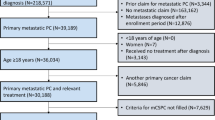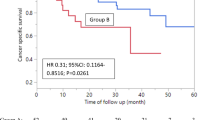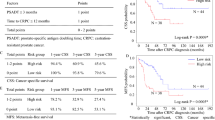Abstract
Aim:
To examine the outcomes of patients with advanced prostate carcinoma who underwent medical or surgical castration.
Methods:
A hundred twenty one consecutive cases of patients with advanced prostate carcinoma who underwent medical or surgical castration between 2001 and 2006 were retrospectively reviewed. Associations between clinical outcomes and prognostic scoring factors were determined based on the Reijke study. In the surgical and medical castration groups, the impact on the prostate-specific antigen (PSA) normalization rate, the rebound rate and the disease-free survival rate were evaluated. The mean follow-up was 36.1 months.
Results:
In the initial 12 months, there were no statistical differences in the PSA normalization rate and the PSA rebound rate between the two groups. However, the PSA rebound rate after the 12th month (20.90% vs 40.74%, P=0.0175) and the 18th month PSA normalization rate (59.70% vs 37.04%, P=0.0217) differed significantly between the two groups, and these differences were maintained to the end of the study. When comparing patients grouped according to Reijke prognosis scores, there was no difference between medical and surgical castration for the good prognosis group. However, among the patients given a poor prognosis, surgical castration was superior in terms of the PSA normalization rate, the PSA rebound rate, the tumor progression-free survival rate (P<0.001) and the overall survival rate (P<0.001).
Conclusion:
Advanced prostate carcinoma patients with poor pretreatment prognosis scores should undergo surgical castration rather than medical castration for better PSA rebound rates and overall survival.
Similar content being viewed by others
Log in or create a free account to read this content
Gain free access to this article, as well as selected content from this journal and more on nature.com
or
References
Stamey T, Yang N, Hay A, McNeal J, Freiha F, Redwine E . Prostate-specific antigen as a serum marker for adenocarcinoma of the prostate. N Engl J Med 1987; 317: 909–16.
Wang MC, Valenzuela LA, Murphy GP, Chu TM . Purification of a human prostate specific antigen. Invest Urol 1979; 17: 159–63.
Loblaw DA, Virgo KS, Nam R, Somerfield MR, Ben-Josef E, Mendelson DS, et al. Initial hormonal management of androgen-sensitive metastatic, recurrent, or progressive prostate cancer: 2007 Update of an American Society of Clinical Oncology Practice Guideline. J Clin Oncol 2007; 25: 1596–605.
Huggins C, Hodges CV . Studies on prostatic cancer: I. The effect of castration, of estrogen and of androgen injection on serum phosphatases in metastatic carcinoma of the prostate. Cancer Res 1941; 1: 293–7.
Studer UE, Collette L, Whelan P, Albrecht W, Casselman J, de Reijke T, et al. Using PSA to guide timing of androgen deprivation in patients with T0-4 N0-2 M0 prostate cancer not suitable for local curative treatment (EORTC 30891). Eur Urol 2008; 53: 941–9.
Studer UE, Whelan P, Albrecht W, Casselman J, de Reijke T, Hauri D, et al. Immediate or deferred androgen deprivation for patients with prostate cancer not suitable for local treatment with curative intent: European Organisation for Research and Treatment of Cancer (EORTC) Trial 30891. J Clin Oncol 2006; 24: 1868–76.
Anderson J, Abrahamsson PA, Crawford D, Miller K, Tombal B . Management of advanced prostate cancer: can we improve on androgen deprivation therapy? BJU Int 2008; 101: 1497–501.
Saylor PJ, Smith MR . Metabolic complications of androgen deprivation therapy for prostate cancer. J Urol 2009; 181: 1998–2006.
Labrie F, Dupont A, Belanger A, Lacoursiere Y, Raynaud JP, Husson JM, et al. New approach in the treatment of prostate cancer: complete instead of partial withdrawal of androgens. The Prostate 1983; 4: 579–94.
Samson DJ, Seidenfeld J, Schmitt B, Hasselblad V, Albertsen PC, Bennett CL, et al. Systematic review and meta-analysis of monotherapy compared with combined androgen blockade for patients with advanced prostate carcinoma. Cancer 2002; 95: 361–76.
Eisenberger MA, Blumenstein BA, Crawford ED, Miller G, McLeod DG, Loehrer PJ, et al. Bilateral orchiectomy with or without flutamide for metastatic prostate cancer. N Engl J Med 1998; 339: 1036–42.
Loblaw DA, Mendelson DS, Talcott JA, Virgo KS, Somerfield MR, Ben-Josef E, et al. American Society of Clinical Oncology recommendations for the initial hormonal management of androgen-sensitive metastatic, recurrent, or progressive prostate cancer. J Clin Oncol 2004; 22: 2927–41.
Weight CJ, Klein EA, Jones JS . Androgen deprivation falls as orchiectomy rates rise after changes in reimbursement in the US medicare population. Cancer 2008; 112: 2195–201.
Chodak GW . Is the increase in orchiectomy for prostate cancer patients appropriate? Cancer 2008; 112: 2106–7.
Morote J, Esquena S, Abascal JM, Trilla E, Cecchini L, Raventós CX, et al. Failure to maintain a suppressed level of serum testosterone during long-acting depot luteinizing hormone-releasing hormone agonist therapy in patients with advanced prostate cancer. Urol Int 2006; 77: 135–8.
Kaisary AV, Tyrrell CJ, Peeling WB, Griffiths K . Comparison of LHRH analogue (Zoladex) with orchiectomy in patients with metastatic prostatic carcinoma. Br J Urol 1991; 67: 502–8.
Bubley GJ . Is the flare phenomenon clinically significant? Urology 2001; 58: 5–9.
de Reijke T, Derobert E . Prognostic factor analysis in patients with advanced prostate cancer treated by castration plus anandron or placebo: a final update. Eur Urol 2002; 42: 139–46.
Studer UE, Whelan P, Albrecht W, Casselman J, de Reijke T, Hauri D, et al. Immediate or deferred androgen deprivation for patients with prostate cancer not suitable for local treatment with curative intent: European Organisation for Research and Treatment of Cancer (EORTC) Trial 30891. J Clin Oncol 2006; 24: 1868–76.
Chuang CK, Chu SH, Chiang YJ, Chun-Te Wu M, Lin MH, Wei TY, et al. Tolerability assessment of maximal androgen blockade with 50 mg daily of bicalutamide and castration in patients with advanced prostate cancer. Chang Gung Med J 2002; 25: 577–82.
Albertsen P . Androgen deprivation in prostate cancer–step by step. N Engl J Med 2009; 360: 2572–4.
Shahinian VB, Kuo YF, Freeman JL, Orihuela E, Goodwin JS . Increasing use of gonadotropin-releasing hormone agonists for the treatment of localized prostate carcinoma. Cancer 2005; 103: 1615–24.
Barry MJ, Delorenzo MA, Walker-Corkery ES, Lucas FL, Wennberg DC . The rising prevalence of androgen deprivation among older American men since the advent of prostate-specific antigen testing: a population-based cohort study. BJU Int 2006; 98: 973–8.
Wong YN, Freedland SJ, Egleston B, Vapiwala N, Uzzo R, Armstrong K . The role of primary androgen deprivation therapy in localized prostate cancer. Eur Urol 2009; 56: 609–16.
Lu-Yao GL, Albertsen PC, Moore DF, Shih W, Lin Y, DiPaola RS, et al. Survival following primary androgen deprivation therapy among men with localized prostate cancer. JAMA 2008; 300: 173–81.
Diblasio CJ, Malcolm JB, Hammett J, Wan JY, Aleman MA, Patterson AL, et al. Survival outcomes in men receiving androgen-deprivation therapy as primary or salvage treatment for localized or advanced prostate cancer: 20-year single-centre experience. BJU Int 2009; 104: 1208–14.
Keating NL, O'Malley AJ, McNaughton-Collins M, Oh WK, Smith MR . Use of androgen deprivation therapy for metastatic prostate cancer in older men. BJU Int 2008; 101: 1077–83.
Messing EM, Manola J, Yao J, Kiernan M, Crawford D, Wilding G, et al. Immediate versus deferred androgen deprivation treatment in patients with node-positive prostate cancer after radical prostatectomy and pelvic lymphadenectomy. Lancet Oncol 2006; 7: 472–9.
Messing EM, Manola J, Sarosdy M, Wilding G, Crawford ED, Trump D . Immediate hormonal therapy compared with observation after radical prostatectomy and pelvic lymphadenectomy in men with node-positive prostate cancer. N Engl J Med 1999; 341: 1781–8.
Bolla M, Gonzalez D, Warde P, Dubois JB, Mirimanoff RO, Storme G, et al. Improved survival in patients with locally advanced prostate cancer treated with radiotherapy and goserelin. N Engl J Med 1997; 337: 295–300.
D'Amico AV, Manola J, Loffredo M, Renshaw AA, DellaCroce A, Kantoff PW . 6-Month androgen suppression plus radiation therapy vs radiation therapy alone for patients with clinically localized prostate cancer: a randomized controlled trial. JAMA 2004; 292: 821–7.
Morgentaler A, Traish AM . Shifting the paradigm of testosterone and prostate cancer: the saturation model and the limits of androgen-dependent growth. Eur Urol 2009; 55: 310–20.
Oefelein MG, Cornum R . Failure to achieve castrate levels of testosterone during luteinizing hormone releasing hormone agonist therapy: the case for monitoring serum testosterone and a treatment decision algorithm. J Urol 2000; 164: 726–9.
Yri OE, Bjoro T, Fossa SD . Failure to achieve castration levels in patients using leuprolide acetate in locally advanced prostate cancer. Eur Urol 2006; 49: 54–8; discussion 58.
Tombal B . The importance of testosterone control in prostate cancer. Eur Urol Suppl 2007; 6: 834–9.
Tombal B, Berges R . How good do current lhrh agonists control testosterone? Can this be improved with Eligard®? Eur Urol Suppl 2005; 4: 30–6.
Acknowledgements
This study was supported by research grants from Chang Gung Memorial Hospital (No CMRPD-170471 and CMRPD-160131) and the National Science Council, Taiwan, China (No 97-2320-B-182-023-MY3 and 98-2314-B-182-042-MY3).
Author information
Authors and Affiliations
Corresponding author
Rights and permissions
About this article
Cite this article
Lin, Yh., Chen, Cl., Hou, Cp. et al. A comparison of androgen deprivation therapy versus surgical castration for patients with advanced prostatic carcinoma. Acta Pharmacol Sin 32, 537–542 (2011). https://doi.org/10.1038/aps.2010.236
Received:
Accepted:
Published:
Issue date:
DOI: https://doi.org/10.1038/aps.2010.236
Keywords
This article is cited by
-
Cardiovascular Impact of Androgen Deprivation Therapy: from Basic Biology to Clinical Practice
Current Oncology Reports (2023)
-
Bilateral Orchidectomy Revisited in Management of Metastatic Hormone-Sensitive Prostate Cancer
Indian Journal of Surgical Oncology (2021)



